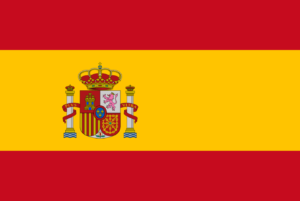
Region: Europe
Disability Definition
According to the 2013 General Law on Rights of Persons with Disabilities and Their Social Inclusion: “people with disabilities are people who have physical, physical, intellectual or sensorial impairment, which will predictably be permanent, and when they interact with a range of barriers, these can prevent them from participating fully and effectively in society in the same conditions as others.”
Legislation
The Royal Legislative Decree 1/2013, the General Law on Rights of Persons with Disabilities and their Social Inclusion, effective on December 4, 2013, consolidated:
- General Law 13/1982 on rights of persons with disabilities and their social integration
- Law 51/2003 on Equal Opportunities
- And the 2007 Equal Opportunities Act
The law establishes “the infringements and penalties regime regarding equal opportunities, non discrimination and accessibility for people with disabilities.”
Spain ratified UN Convention on the Rights of People with Disabilities on 3 December 2007.
Employer Legal Requirements
“Workers with disabilities must account for at least 2 percent of the employees of public or private enterprises employing 50 or more workers.” Public or private enterprises can be exempt from the obligation either through covenants in statewide industry collective bargaining agreements or notifying the labor authority, provided that in both cases the alternative measures that will be determined in regulations are applied.
In public sector job offers, a quota will be set aside to be filled by people with disabilities on the terms established in the legislation governing this subject.”
Reference: Título (garrigues.com)
Accessibility Requirements
Spain developed the National Accessibility Plan in Spain to remove architectural barriers that remain. The plan will also address access to goods and services along with public administrations. More information on the effectiveness of the plan can be found in this report.
Royal Decree 1494/2007 approves the Regulation on the basic conditions for access of people with disabilities to technologies, products and services related to the information society and social media.
Royal Decree 1112/2018 provides guidance for the accessibility of websites and applications for mobile devices in the public sector.
The Spanish standards organization, AENOR, developed a Spanish web accessibility standard UNE 139803:2004. UNE 139803 is the official standard for web accessibility in Spain and defines the level of accessibility for public sector organizations (government websites) based on Law 34 of 2002 and Law 51 of 2003. UNE 139803:2012 updates the requirements and are based largely on WCAG 2.0 Level AA.
The European Accessibility Act ensures the accessibility of a number of products and services within Member States.
Cultural Norms
“The attitudes towards people with disabilities in Spain have been changing over the years, from a focus on charity and medical models to social models that emphasize equal rights, accessibility, and inclusion. In the past, people with disabilities were often hidden away in institutions or their homes, but the disability movement in Spain has helped to bring them into the mainstream.
According to a survey conducted by the Spanish Committee of Representatives of Persons with Disabilities, 80% of people with disabilities believe that society does not accept them as equals. This is reflected in the lack of access to education, employment, and public spaces. However, the same survey found that the majority of the general population is supportive of the inclusion of people with disabilities in society.”
Reference: Spain – Disability – Expat Focus
Business Practices/Examples
Additional content coming soon.
Insights
“In 2020, over three million people had a recognized degree of disability equal to or greater than 33 percent in Spain. The type of disability affecting most individuals was osteoarticular, with more than 916 thousand people. Meanwhile, the number of individuals with a recognized degree of mental impairment reached over 581 thousand people in the country.”
Data from the National Institute of Statistics suggests that in 2020 there were 516,000 employed people with disabilities, the highest figure since 2014.
Reference: Individuals with a recognized degree of disability by type Spain 2022 | Statista and More Than 516,000 People With Disabilities Worked In Spain In 2020, The Highest Figure In History | The Corner
Supplier Diversity
Certification is currently in place for women-owned businesses (WeConnect).
Talent Sourcing Resources
The Spanish Confederation of People with Physical and Organic Disabilities (COCEMFE) is a non-profit association with the goal to achieve the full inclusion and active participation of people with physical and organic disabilities in all areas of society.
Additional Resources
ONCE is the Spanish organisation for the blind and other disabled persons and they offer advice in areas such as management and accounting. Also provides grants to increase training and employability of persons with disabilities.
COCEMFE is a non-profit non-governmental organization that was constituted in 1980. Its objective is to unite, strengthen, train and coordinate the efforts and activities of the entities that work in favor of the people with physical and organic disabilities to defend their rights and improve their quality of life. Reference their Talent Sourcing capability in the above section.
National Confederation of Deaf People (CNSE) is a non-profit and statewide social action NGO that was founded in 1936. Since its creation, the CNSE has developed a work of vindication and political advocacy to achieve full citizenship of deaf people, as well as the implementation of care and service delivery programs through its federations and associations of deaf people.
SID – Organización Nacional de Discapacitados (National Organisation for the Disabled) is an information directory for support and related services.a
References
DOTCOM: the Disability Online Tool of the Commission – Spain (Operated by The Academic Network of European Disability Experts (ANED)): Site contains details on the UN Convention, Optional Protocol, reporting, national legal framework, accessibility, national action plan and more.
NGOs
European Disability Forum (EDF) is an independent European non-governmental organization (ENGO) that represents the interests of 50 million disabled people in the European Union and stands for their rights. It was created in 1996 and is based in Brussels.
